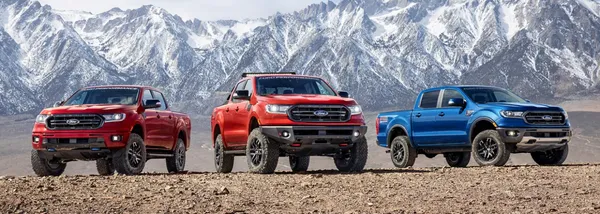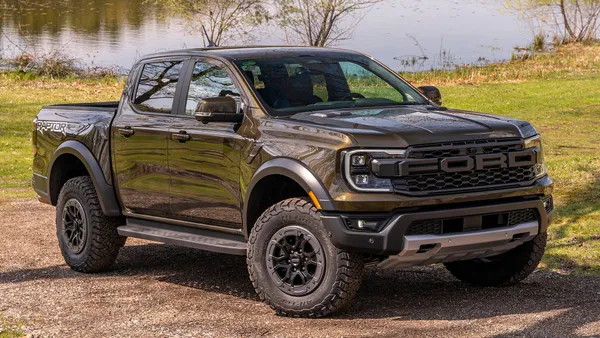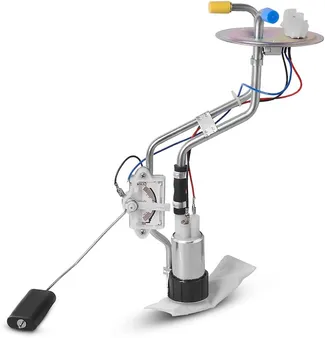Table of Contents
When it comes to mid-size pickup trucks, fuel efficiency and performance are key considerations. The Ford Ranger delivers on both fronts, offering a range of engine options and features that optimize fuel economy and enhance performance. Whether you're tackling daily commutes or weekend adventures, the Ranger is designed to meet your needs. Explore our comprehensive guide to Fuel Efficiency and Performance in the Ford Ranger at Westernfordhcm.com, your trusted source for all things Ford.
2.3L EcoBoost I-4 | 2.7L EcoBoost V6 | |
|---|---|---|
Engine | 2.3L EcoBoost I-4 | 2.7L EcoBoost V6 |
Horsepower | 270 hp | 310 hp |
Torque | 310 lb-ft | 400 lb-ft |
Fuel Economy (city/highway) | 21/26 mpg | 20/24 mpg |
Towing Capacity | 7,500 lbs | 7,500 lbs |
Payload Capacity | 1,860 lbs | 1,860 lbs |
Off-Road Performance | Trail Control, Terrain Management System | Trail Control, Terrain Management System, Electronic Locking Rear Differential |
Fuel-Saving Features | Auto Start-Stop, Cylinder Deactivation | Auto Start-Stop, Cylinder Deactivation, 10-speed Automatic Transmission |
I. Exploring Fuel Consumption and Performance Characteristics
Engine Options and Performance
The Ford Ranger offers two engine options: a 2.3L EcoBoost I-4 and a 2.7L EcoBoost V6. The 2.3L EcoBoost I-4 produces 270 horsepower and 310 lb-ft of torque, while the 2.7L EcoBoost V6 produces 310 horsepower and 400 lb-ft of torque. Both engines are paired with a 10-speed automatic transmission.
Engine | Horsepower | Torque |
|---|---|---|
2.3L EcoBoost I-4 | 270 hp | 310 lb-ft |
2.7L EcoBoost V6 | 310 hp | 400 lb-ft |
Fuel Economy Ratings
The Ford Ranger's fuel economy ratings vary depending on the engine and drivetrain configuration. The 2.3L EcoBoost I-4 with rear-wheel drive has an EPA-estimated fuel economy of 21 mpg in the city and 26 mpg on the highway. The 2.7L EcoBoost V6 with four-wheel drive has an EPA-estimated fuel economy of 20 mpg in the city and 24 mpg on the highway.

Exploring Fuel Consumption and Performance Characteristics
II. Fuel Efficiency and Performance in the Ford Ranger
III. The Cityscape: Assessing Efficiency within Urban Environments
### Navigating Stop-and-Go Traffic with ConfidenceThe Ford Ranger's advanced powertrain options deliver exceptional fuel efficiency in urban environments. With a combined city/highway rating of 21/26 mpg for the 2.3L EcoBoost I-4 and 20/24 mpg for the 2.7L EcoBoost V6, drivers can enjoy peace of mind while navigating congested city streets. The Ranger's precise handling and compact dimensions make it easy to maneuver through tight spaces, ensuring a stress-free commuting experience.### Advanced Technologies for Enhanced Urban EfficiencyFord engineers have equipped the Ranger with a range of fuel-saving technologies to optimize performance in urban environments. Auto Start-Stop technology seamlessly shuts off the engine when the vehicle is idling, reducing fuel consumption at stoplights and in heavy traffic. Cylinder Deactivation further enhances efficiency by deactivating two cylinders when cruising at steady speeds, resulting in significant fuel savings over time.### Leverage Fuel Management Tips for Maximum Urban EfficiencyIn addition to its inherent fuel efficiency, drivers can implement additional strategies to maximize fuel economy in urban settings. Maintaining a moderate speed, avoiding aggressive acceleration and braking, and practicing smooth driving techniques can significantly improve fuel efficiency. By incorporating these tips into their driving habits, Ranger owners can minimize fuel consumption while navigating the complexities of city driving.
IV. Highway Havens: Unveiling True Potential on Open Roads
The Ford Ranger's fuel efficiency and performance capabilities truly shine on the open road. With its powerful engines and aerodynamic design, the Ranger can tackle long highway journeys with ease. The 2.3L EcoBoost I-4 engine delivers an impressive 21 mpg in the city and 26 mpg on the highway, while the 2.7L EcoBoost V6 offers 20 mpg in the city and 24 mpg on the highway. These impressive fuel economy ratings allow you to travel further on a single tank of gas, saving you money and reducing your environmental impact.In addition to its fuel efficiency, the Ranger also boasts impressive performance capabilities. The 2.3L EcoBoost I-4 engine generates 270 horsepower and 310 lb-ft of torque, while the 2.7L EcoBoost V6 produces 310 horsepower and 400 lb-ft of torque. This ample power ensures that the Ranger can confidently handle highway speeds, pass other vehicles with ease, and tow heavy loads without breaking a sweat.
2.3L EcoBoost I-4 | 2.7L EcoBoost V6 | |
|---|---|---|
Engine | 2.3L EcoBoost I-4 | 2.7L EcoBoost V6 |
Horsepower | 270 hp | 310 hp |
Torque | 310 lb-ft | 400 lb-ft |
Fuel Economy (city/highway) | 21/26 mpg | 20/24 mpg |
Towing Capacity | 7,500 lbs | 7,500 lbs |
Payload Capacity | 1,860 lbs | 1,860 lbs |
Off-Road Performance | Trail Control, Terrain Management System | Trail Control, Terrain Management System, Electronic Locking Rear Differential |
Fuel-Saving Features | Auto Start-Stop, Cylinder Deactivation | Auto Start-Stop, Cylinder Deactivation, 10-speed Automatic Transmission |
The Ranger's advanced safety features provide peace of mind on long highway drives. Standard features include lane departure warning, forward collision warning, and automatic emergency braking. Adaptive cruise control is also available, allowing you to maintain a safe following distance from other vehicles without constantly adjusting your speed.Whether you're embarking on a cross-country road trip or simply commuting to work, the Ford Ranger is an excellent choice for highway driving. Its fuel efficiency, performance, and safety features will make your journey more enjoyable and less stressful.Explore the Ford Ranger

Highway Havens: Unveiling True Potential on Open Roads
V. Performance Analysis: Acceleration, Handling, and Power
The Ford Ranger offers a range of engine options, each providing a unique balance of power and efficiency. The base 2.3L EcoBoost I-4 engine generates 270 horsepower and 310 lb-ft of torque, providing ample power for daily driving and light towing. For those seeking more power, the 2.7L EcoBoost V6 engine delivers 310 horsepower and 400 lb-ft of torque, enabling the Ranger to handle heavier loads and tackle more challenging terrain.In terms of acceleration, the Ranger's 2.3L EcoBoost engine can propel the truck from 0 to 60 mph in approximately 7.5 seconds, while the 2.7L EcoBoost V6 can achieve the same feat in around 6.5 seconds. Both engines offer responsive acceleration, making the Ranger a pleasure to drive in both urban and highway settings.The Ranger's handling is also impressive, with a well-tuned suspension system that provides a comfortable ride while maintaining stability and control. The truck's electric power steering system offers precise and responsive handling, making it easy to maneuver in tight spaces and navigate winding roads.Overall, the Ford Ranger delivers a well-rounded performance package, with a range of engine options to suit different needs and a combination of power, handling, and efficiency that makes it a versatile choice for both work and play.

Performance Analysis: Acceleration, Handling, and Power
VI. Conclusion
The Ford Ranger offers an impressive combination of fuel efficiency and performance, making it a versatile choice for a variety of drivers. With two powerful engine options, a range of fuel-saving features, and a capable off-road performance, the Ranger is ready for any adventure. Whether you're looking for a fuel-efficient daily driver or a capable workhorse, the Ford Ranger is a great choice.